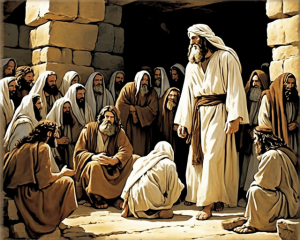From Fierce Opponent to Faithful Apostle: The Remarkable Redemption of Saul


In the budding days of a faith movement that swept through ancient lands, tales of a Messiah named Yeshua stirred both hope and hostility. Followers of The Way faced a mix of wonder and wariness from those around them. Among their most relentless adversaries was a Pharisee named Saul. He pursued, imprisoned, and even sanctioned the execution of believers. The Book of Acts recounts, “Saul began to destroy the church. Going from house to house, he dragged off both men and women and put them in prison” (Acts 8:3).
But the trajectory of his life took a radical turn on the dusty pathways leading to Damascus.
Under the blazing sun, an even brighter, divine light suddenly engulfed Saul. Overcome, he crumbled to the ground. From within the brilliance, a voice emerged, reshaping his fate: “Saul, Saul, why do you persecute me?” (Acts 9:4). In this sacred interaction, Yeshua underscored the profound truth: to harm His followers was to harm Him.
Blinded and disoriented, Saul’s companions guided him into the heart of Damascus. For three days, he existed in a realm of darkness, neither partaking of food nor drink. These days were a crucible of introspection, anticipation, and deep vulnerability.
Within the city walls resided a disciple named Ananias. A divine vision prompted him towards Saul. Naturally apprehensive, Ananias was all too aware of the tales that trailed Saul. Yet, the Lord’s words were reassuring: “Go! This man is my chosen instrument to proclaim my name to the Gentiles and their kings and to the people of Israel” (Acts 9:15).
Upon his encounter with Saul, Ananias not only restored his sight but also imbued him with the Holy Spirit. The once-feared persecutor of the church emerged reborn, baptized, and with a mission. As Paul, he proclaimed in synagogues that Yeshua is the Son of God. His transformation was so profound that listeners marveled, questioning, “Isn’t he the man who caused havoc in Jerusalem among those who invoke this name?” (Acts 9:21).
The epistles and travels of Paul significantly shaped the New Testament. Reflecting on his spiritual rebirth, he wrote, “I have been crucified with Christ and I no longer live, but Christ lives in me. The life I now live in the body, I live by faith in the Son of God, who loved me and gave himself for me” (Galatians 2:20).
Saul’s evolution into Paul stands as a testament to the limitless grace and love of God. It illuminates the promise that no soul, irrespective of its past, is beyond the transformative touch of the Divine.

